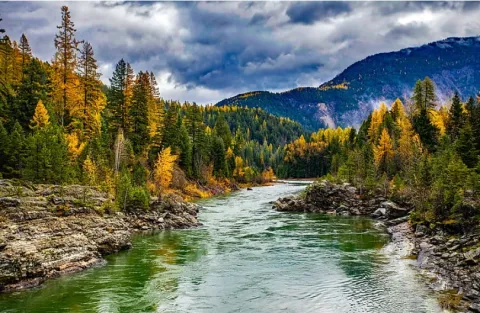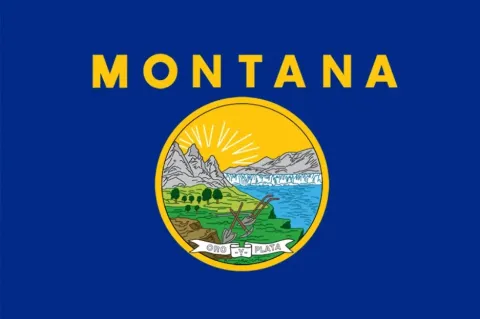
Montana, known as the "Treasure State," offers a unique blend of natural beauty, outdoor adventures, and a laid-back lifestyle that appeals to retirees seeking a peaceful and fulfilling life. This article explores the overall quality of life, cost of living, crime and safety, access to healthcare, weather, and culture in Montana, with comparisons to the national average.
Montana is renowned for its stunning landscapes, including vast plains, majestic mountains, and pristine lakes. The state's low population density contributes to a slower pace of life, offering retirees a tranquil environment. Outdoor enthusiasts can enjoy activities such as hiking, fishing, and skiing, making Montana an ideal destination for those who love nature.
Compared to the national average, Montana boasts a strong sense of community and a low-stress lifestyle. The state's small-town charm and friendly residents create a welcoming atmosphere. However, those accustomed to urban amenities may find the state's rural nature and limited access to certain services a downside.
Montana's cost of living is slightly higher than the national average, primarily due to housing costs. While the state offers affordable options in some rural areas, popular destinations like Bozeman and Missoula can be more expensive. The median home price in Montana is higher than the national median, reflecting the demand for housing in scenic locations.
Other expenses, such as groceries, utilities, and healthcare, are generally on par with or slightly above the national average. However, Montana does not have a state sales tax, which can offset some of the higher costs. Retirees can find a range of living options, from small towns to more developed cities, each offering different price points.
Montana is considered a relatively safe state, with lower crime rates compared to the national average. The state's violent crime rate is below the national average, making it a safer place for retirees. However, property crime rates can vary depending on the region, with some areas experiencing higher rates than others.
Overall, Montana's strong community ties and rural nature contribute to a sense of safety and security. Retirees can find peaceful neighborhoods and enjoy a relaxed lifestyle without significant concerns about crime.
Access to healthcare in Montana is a mixed bag. While the state has several quality healthcare facilities, including well-regarded hospitals in larger cities like Billings and Missoula, rural areas may have limited access to specialized care. The state's low population density means that some residents may need to travel significant distances for medical services.
Montana's healthcare costs are generally in line with the national average, but the availability of providers can vary. The state has a higher ratio of physicians per capita than the national average, but access to specialists may be limited in rural areas. Retirees should consider their healthcare needs and proximity to medical facilities when choosing a place to live in Montana.
Montana's overall tax burden is relatively moderate when compared to other U.S. states. The state does not have a sales tax, which is a significant factor in its tax landscape. However, Montana does levy an individual income tax, with rates that are slightly higher than average, and property taxes that also contribute to the state's overall tax burden.
Compared to other states, Montana ranks around the middle in terms of tax burden, making it more affordable than many states with higher tax rates, particularly those with both income and sales taxes. The absence of a sales tax can be particularly beneficial for residents, especially those with lower incomes, as it reduces the overall cost of living. However, the reliance on income and property taxes means that residents still face a notable tax obligation, particularly in regions with higher property values.
Overall, Montana provides a balanced tax environment, neither the most burdensome nor the lightest, making it a competitive option for those considering relocation based on tax considerations.
Montana's culture is deeply rooted in its Western heritage, with a strong emphasis on outdoor activities, self-reliance, and community. The state hosts numerous cultural events, including rodeos, fairs, and festivals that celebrate its history and traditions. Art and music are also prominent, with local galleries, theaters, and music venues offering a range of cultural experiences.
Compared to the national average, Montana offers a more relaxed and down-to-earth cultural scene. While the state may not have the same level of diversity and cultural amenities as larger metropolitan areas, it provides a unique and authentic experience that appeals to many retirees.
Montana experiences a diverse climate, with four distinct seasons. The state is known for its cold winters, especially in the mountainous regions, where heavy snowfall is common. Summers are generally warm and dry, with temperatures ranging from mild to hot, depending on the area.
Compared to the national average, Montana's weather can be more extreme, particularly during winter. However, the state's sunny days and low humidity levels make the climate enjoyable for many. Retirees who enjoy outdoor activities can find opportunities year-round, from skiing in the winter to hiking and fishing in the summer.
Montana offers a unique blend of natural beauty, outdoor activities, and a relaxed lifestyle that appeals to retirees seeking a peaceful and fulfilling retirement. While the cost of living and access to healthcare can vary, the state's strong sense of community, safety, and cultural heritage make it an attractive destination for those looking to enjoy their golden years in a picturesque setting. Retirees considering Montana should weigh the pros and cons based on their preferences and needs to find the perfect place to call home.




